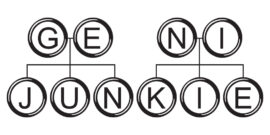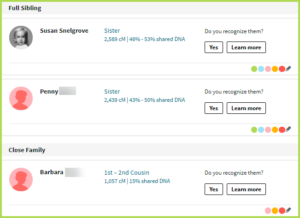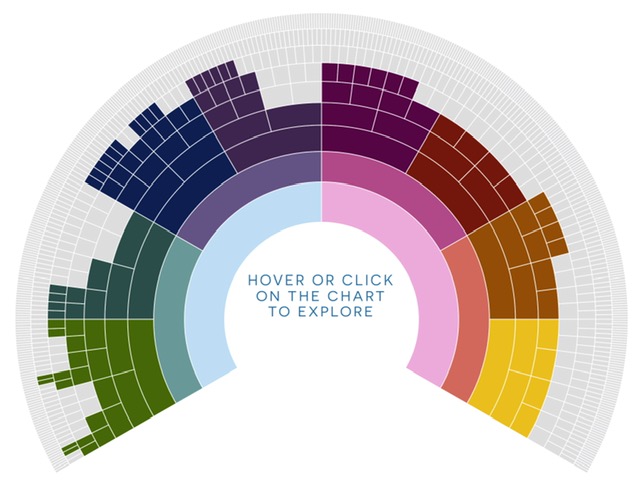
When starting your Newfoundland genealogy research, the first thing you might do is get a subscription to an on-line genealogy website. You will find all kinds of valuable data sets to start tracing your Newfoundland roots. Plus these sites have software platforms that can help you easily build your tree on-line.
That said, there are only so many Canadian genealogical records at these sites, and even fewer pertain to Newfoundland and Labrador specifically.
If you are a novice, you might mistakenly think that is all there is. Far from it! In this Blog I will point you to the many useful places you can find records to help with your Newfoundland genealogy research. And the great news is that almost all of them are free! I have embedded links within the Blog, but these can also be found on my Newfoundland Links Page.
Newfoundland Grand Banks
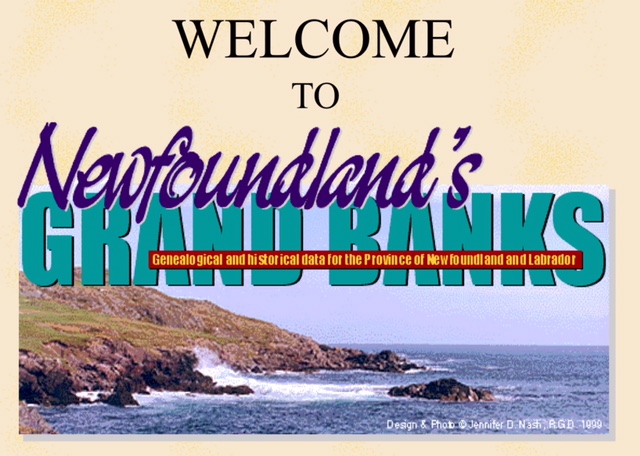
The Newfoundland Grand Banks website is the first and (almost) only stop you need to make for genealogy research in Newfoundland and Labrador. This website was started more than two decades ago by its founder, Bill Crant. It is manned by a network of volunteers giving their time and energy to transcribe historical and genealogical material specific to Newfoundland and Labrador.
I myself was one of the many volunteers starting two decades ago. You will find a lot of material there that was typed by yours truly. You’ll find church and government records for births, marriages and deaths, census records, town and business directories, wills, cemetery transcriptions, newspaper articles, court records and on and on. The record sets are organized regionally. There is good coverage for most areas, but there are variations depending on the number of volunteers who are contributing for each region. Plus there’s a helpful Message Board for posting your research interests to further your collaboration.
We all owe a debt to the many volunteers who give their time and sweat and even their own money to secure and type up records. Not to mention the coordinators who continue to maintain this very large site! Without them, the Newfoundland Grand Banks site wouldn’t be as huge and successful as it is today.
Newfoundland GenWeb
The Newfoundland GenWeb site is part of the larger Canada GenWeb group of genealogy sites, specifically for the province of Newfoundland and Labrador. Again, this site has been around for more than two decades, and it’s similar to the Grand Banks site. It too is staffed by volunteers, and I’m the coordinator for two of the Conception Bay North pages. You will find a lot of similar information here, but there is also some unique information on this site that you won’t find on Grand Banks. I know, because I typed some of it! So, I suggest you check them both as you might find some useful nuggets.
FamilySearch
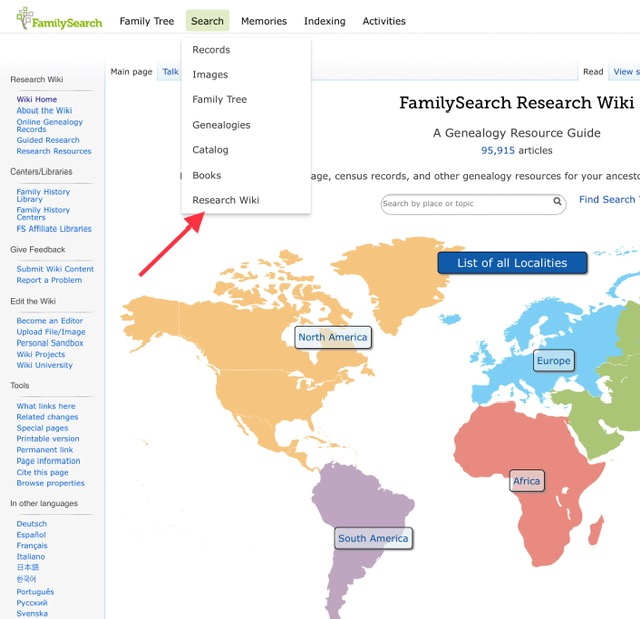
As usual, FamilySearch.org (Latter Day Saints) is a great repository of genealogical data from around the world. They do also have record sets specific to Newfoundland and Labrador, particularly related to births, marriages and deaths. These records are very useful because you can actually view the original scanned document. These same records can be found at other paid sites as well, but FamilySearch is free!
You can also visit a LDS Family History Centre in person in order do your research. As of 2020, there are more than 5100 such LDS centres in 154 countries! While many records are digitally recorded for on-line, the Latter Day Saints have a whole host of information on microfilms and microfiche that you can order and view in person. For years my workplace was quite close to their centre in North Toronto. I went many times to view records there, and found the staff very helpful. Click here to review the catalogue of information they have in their library. You place your order on-line to make sure that the film is onsite when you go to view it.
I imagine, however, the vast majority of their holdings these days are digitized and accessible from their website. A good way to search to see what they have is to use the Research Wiki found on the Search tab. You can drill down by Country and then Province to see what record sets are available and links to find them if they are off the site. In the U.S. the records can be down to the County level. No matter the location, many records are indexed and even if they are not, you can browse through the film.
“The Rooms” – Provincial Archives of Newfoundland & Labrador

The Rooms holds the official archives for the Province, and is located in St. John’s. This is where you would go to do an in person research session, if you are lucky enough to be visiting. They hold all the paper, maps and photographic archives here, and you will find all kinds of historical information that you may not find elsewhere. There is a limited research service if you can’t attend in person.
Please note that a lot of the basic records you would be searching for are already on-line at the websites I mentioned above. So you would go to the Rooms if you wanted to do a “deeper dive”.
Plus it’s a beautiful building with a great view of downtown St. John’s. It’s definitely worth the trip, because the Newfoundland Museum and Art Gallery are also part of the Rooms. I hear they also have a great Café! Enjoy your visit.
Family History Society of Newfoundland & Labrador (FHSNL)
The FHSNL is a wonderful genealogical society that shares a really valuable on-line library of Newfoundland and Labrador resources. Membership is only $42 annually, (or a lifetime membership is $700). With your membership you get their quarterly publication the Ancestor, plus access to on-line records that I’ve not found elsewhere.
My particular favourite is the on-line library of scanned copies of very old court documents, which is organized by region. Some date back to the 1700’s. They aren’t indexed, but I have spent countless happy and very productive hours going page by page through the records. I have found incredibly vital information such as old land records and wills that have helped my research significantly. In my opinion the annual membership is money very well spent, and it also supports the great cause of genealogy in Newfoundland. Since all the other sites are free, you can afford it, right?!
Memorial University (MUN)
Maritime History Archives
As we all know, Newfoundland came into being because of the fishery. Our family search therefore wouldn’t be complete without looking into maritime records. Luckily, there is a lot of information in the archives at MUN (Memorial University) in St. John’s. You can visit in person, or view their on-line records here. One of the interesting records sets is the “Keith Matthews” collection – a repository of surname information culled by this former Professor from old shipping records etc. You might find some useful clues about the origins of your family name here.
On-line Digital Collection
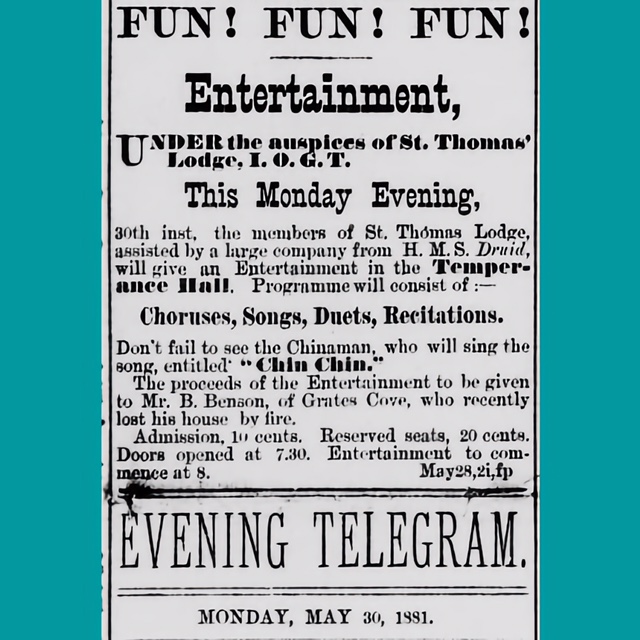
Another one of my favourite research tools is viewing old newspapers. MUN provides these in their on-line digital collections, and the earliest is from 1816!
Some regions of Newfoundland don’t have church records until later than others, and newspapers are a great place to look if you are having trouble. You might find a birth, marriage or death announcement made in the local paper, as well as many other interesting news articles that just might include your town or family name. Even if your interests lie in an outport, I recommend you still check the newspapers for St. John’s. Often they would report news from “around the bay”.
I had always wondered why my great grandmother’s family had moved in the early 1880’s from Grates Cove, Newfoundland into “Town” (St. John’s), where they lived on the Southside. In a newspaper dated May 28, 1881 I found an account of a fundraising concert being held by the sailors of the HMS Druid for my Benson family. You see, their house had burned to the ground and they had nowhere to live. So that certainly does explain the move. This was an exciting find, because these little tidbits add depth to our understanding of our Newfoundland family history.
Newfoundland Wills and Land Records
Many wills have been transcribed by volunteers and posted at the Newfoundland Grand Banks site. But a well kept secret is that you could find some very old probate records stored in an odd place – The Registry of Deeds at the Confederation Building in St. John’s. In one of the rooms on a set of shelves were some very old bound books that contain land records and wills from the 1700 and 1800’s. I went there several times and found a lot of genealogy gold. I sure did get some quizzical glances from the people doing real estate transactions when I pulled those old books down!
This was very long ago, and I wondered if the information was more accessible now. I don’t know if the books are still physically located there, but happily I discovered that at some point in the past decade they have been scanned and placed online. You can find these volumes at the FHSNL website. The on-line volumes are unindexed, but are broken down into the court circuit regions, so you can read through the titles to see generally what topic and years they cover.
You can download the entire scanned volume. Warning: most of the files are HUGE. Once you do that, quite often the book itself had an index that you can refer to. But if not, you literally have to scroll page by page through the volume itself. Sometimes they are several hundreds of pages long. But it is oh so worth it! This in itself is another great reason to get a subscription to the FHSNL.
For registered wills, you can also write to or visit the Probate Office of the Supreme Court on Duckworth Street in downtown St. John’s. I went there myself when I first started my genealogy search, and left with two wills from the 1860’s. The clerk came out from the back room with my great great great grandfather’s will in her hand, saying “now that’s an old one my luv!” It sure was!
Find A Grave
And while we’re on the topic of dead people, cemeteries can be a wealth of genealogical information. If you can’t visit in person, there are great options on line. The Find A Grave website was launched in 1995 by Jim Tipton, whose hobby was visiting and recording graves of famous people. Eventually it was expanded so that volunteers could upload their own photos and records of cemeteries from around the world. In 2013 the site was purchased by Ancestry, but there is no charge to use the site directly. It now has millions of cemetery records!
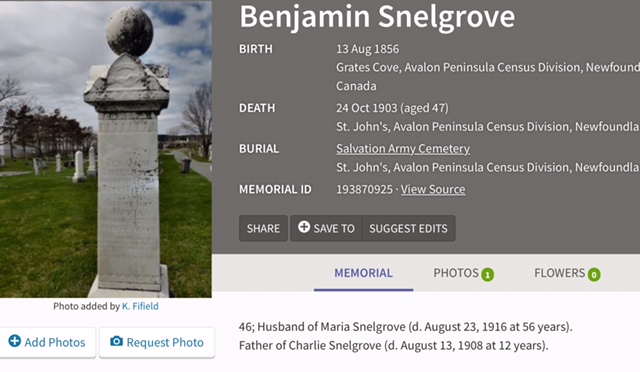
It’s very possible you will find a headstone record for one of your ancestors at Find a Grave. Here’s the entry for my own great grandfather, Benjamin Snelgrove, in the Salvation Army cemetery in St. John’s, Newfoundland.
I would caution however that these entries are made by volunteers, and often times they provide family information beyond just the headstone data. In my case, the photo for my great grandfather also includes information about my grandfather, and my own father. I don’t know who posted the information, but it is 100% wrong! The writer speculates that my father is the twin brother of my grandfather’s son by his first wife. This half brother died more than a decade before my father was even born, but the person suggests they are twins! So be warned. This is a fantastically helpful site in order to get headstone information, but I would take any genealogical information that’s tacked on from unknown sources with a big grain of salt.
Facebook Groups
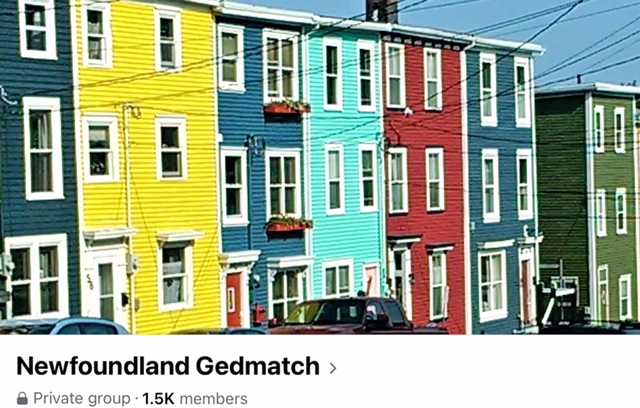
Is there anything of interest these days that can’t be found on Facebook? A search of places or surnames will find a myriad of groups you can join to collaborate with like-minded people. My personal favourite is the Newfoundland Gedmatch group. Membership is open to anyone who has Newfoundland or Labrador ancestry, and who has taken a DNA test and uploaded it to Gedmatch. This is a great place to make direct connections with people who have matching research interests to yours. This group has had a meteoric rise in membership over the past several years of its existence, so you will definitely find a connection. When it first started a few years ago I was one of the first 100 people to join. The current membership is at 1,500!
You’ll also find many Groups that pertain to a single surname or a single place, as well as special genealogy interest groups. The opportunities abound.
Personal Websites
There are a myriad of Newfoundland family history websites that you will find just by typing “Newfoundland” followed by your surname of interest into an internet search engine. There are many dedicated researchers that have been working on their personal family trees for years. These wonderful people have made their information available to us by posting their findings.
I will give one caution. As always, you must consider the source before you record something as fact…. Not all genealogists are created equal. That said, if someone takes the time and huge effort to build a website to house their information, they’re serious! And I think you will get a feeling for the quality of their work product based on the sheer volume of information and the amount of effort they have put into their research. These sites can be a treasure trove of information, because someone else has already done the work for you. Plus, it’s wonderful to find a knowledgeable person to collaborate with, don’t you think?
Open Library (e-books)
I don’t know how many of you have discovered Open Library/Internet Archive, but I have found it really useful. It is a repository of scanned copies of books, some which are very old, and downloadable. I have found many books from the 1800’s that obviously aren’t in circulation any more. I have also found English parish records that have been published in book form, but you can’t find the record sets published at any of the genealogy websites.
You might be surprised what you stumble across. Once you are viewing the e-book, from within it you can do a search for your topic or surname. I have found that since it’s searching a scanned text, the search results might be questionable. So try not to rely on this alone. Quite often there will be a reference index at the back of the book to help. I found a great book about religion in Newfoundland that had many references to people in Lower Island Cove, including my own Snelgrove ancestor.
Good old Google Search (or other internet browser)
You can simply type your search term into the search engine, trying many variations and combinations using wildcards. It can be a needle in a haystack situation, but I have found some pretty amazing things doing this. I did recently see a recommendation that when you search, use the “Incognito” mode to do so. Apparently the google search engines have algorithms that consider your location and past search habits and the results you get are tailored. Using Incognito apparently masks this, so you might find different search results you might not ordinarily have gotten. You can experiment with this and give it a try.
In Conclusion
Note that in the interest of space, I haven’t mentioned absolutely every source specifically to Newfoundland in this Blog. But you’ll probably pick them up when you do your Google search. I have included the Newfoundland genealogy research sources that I have used the most myself. I hope even experienced Newfoundland researchers can come away with even one new idea that they find to be valuable.
Just remember, resourcefulness pays off. I suggest that one of the best resources of all is other researchers. So don’t be shy about collaborating. Often times, you’ll find that two heads are better than one.
Happy hunting!
Your Geni Junkie friend,
Susan Snelgrove
